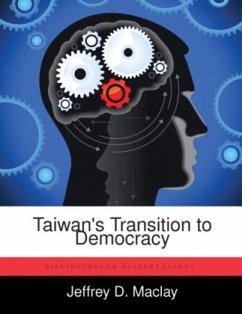Taiwan s transition from authoritarianism to democracy occurred in two phases with economic strength, specifically capitalism, as the catalyst. The hard authoritarianism established by Chiang Kai Shek s regime allowed the institutions of private property and free enterprise to promote economic stability. Rapid growth followed and Taiwan transitioned from an agrarian based economy to a modern industrialized nation. The pressures from economic success drove Chiang Kai shek s successor, Chiang Ching kuo, towards a softer form of authoritarianism. He then exploited the economic successes as a source of legitimacy for his authority. Continued economic progress promoted further calls for liberalization and under President Lee Teng hui, Chiang Ching kuo s successor, Taiwan fully transitioned from soft authoritarianism to a democratic state. This paper will outline the history of this transformation and argue the economic influence of capitalism as the principal driving cause.
vi
vi








